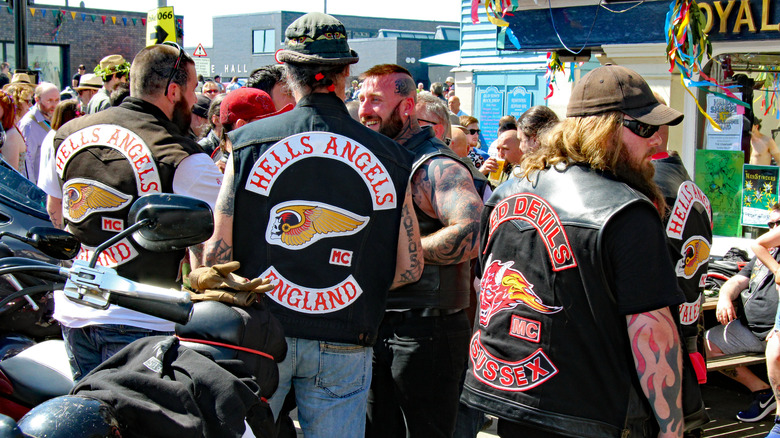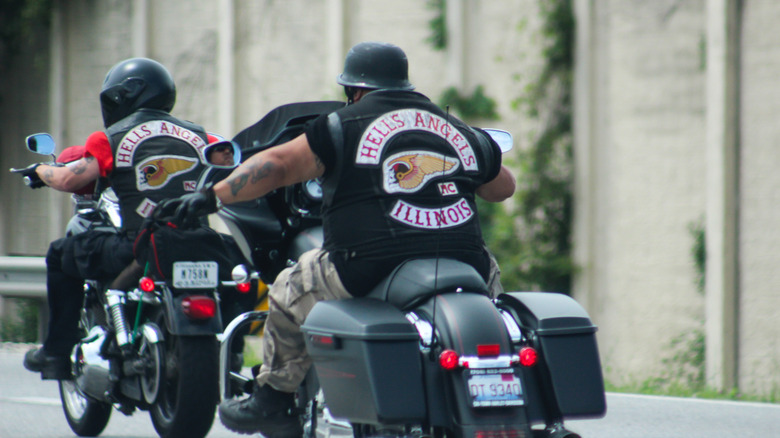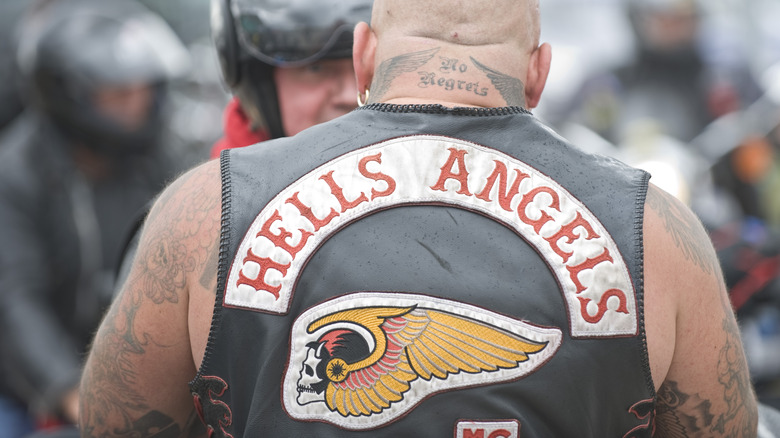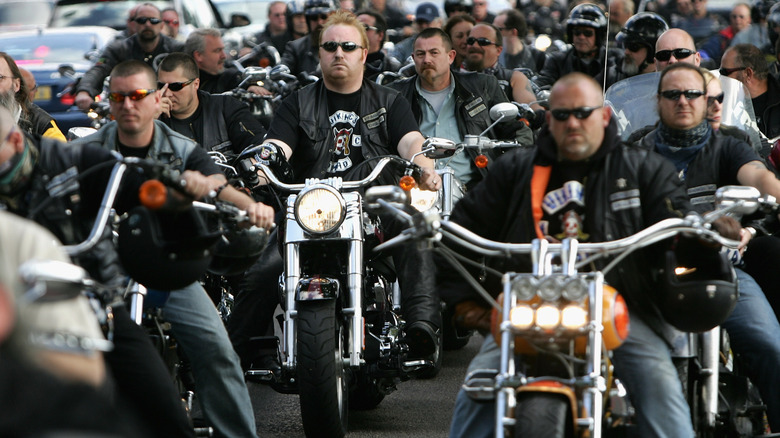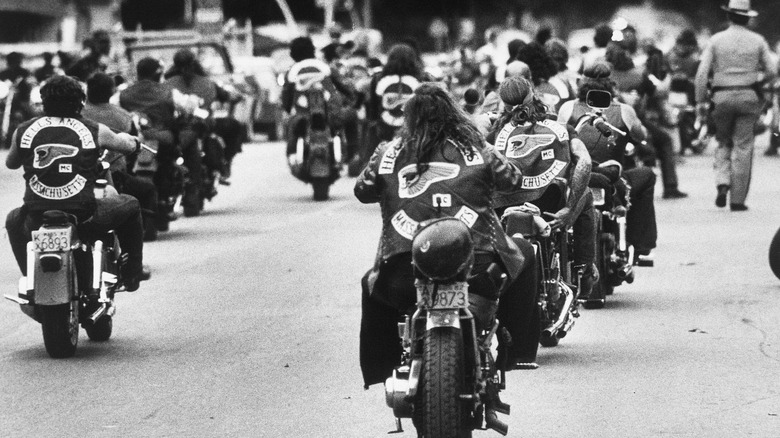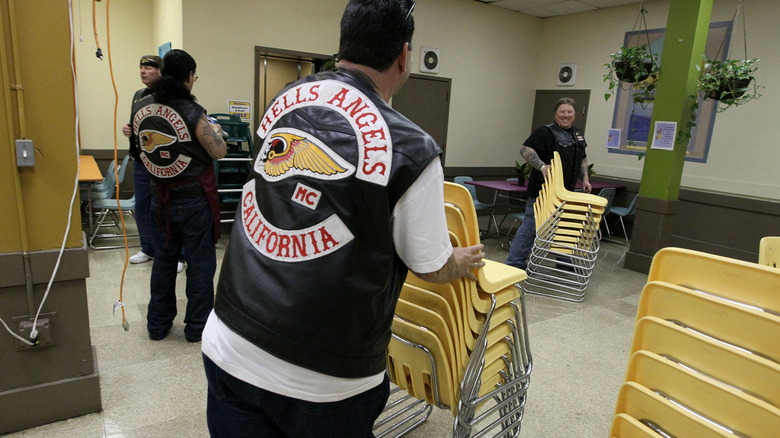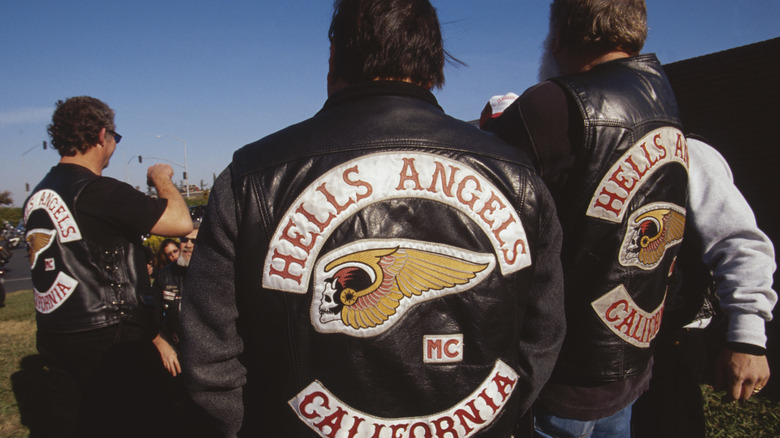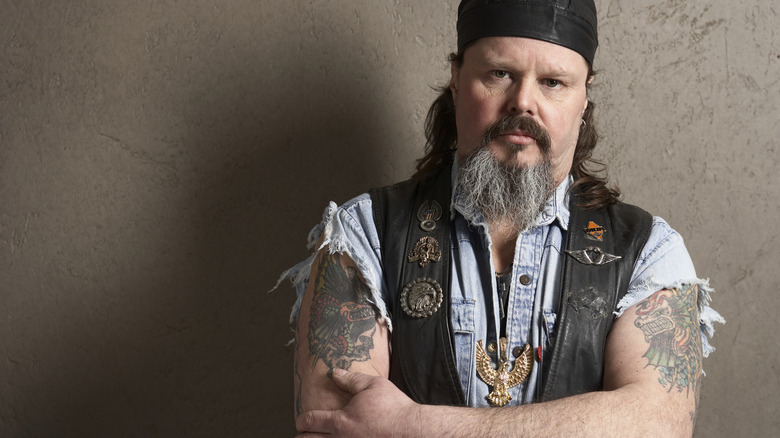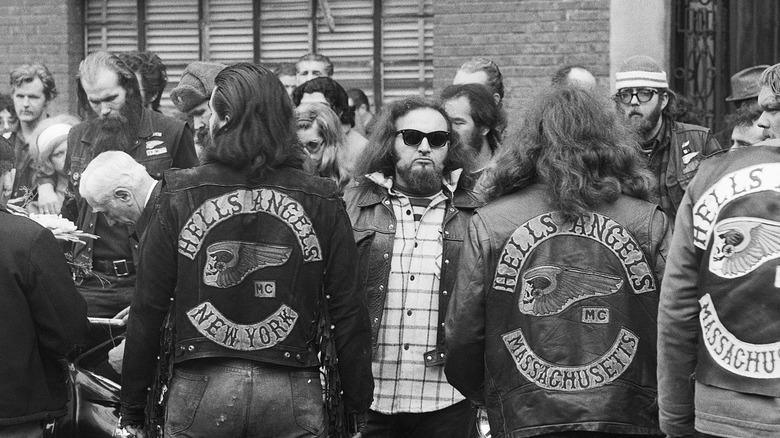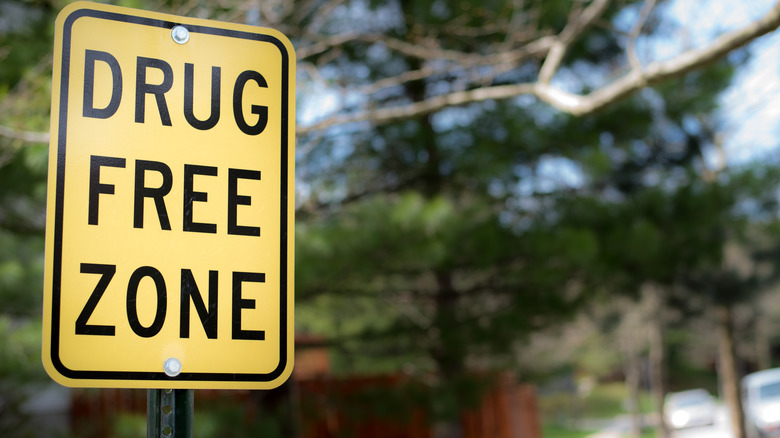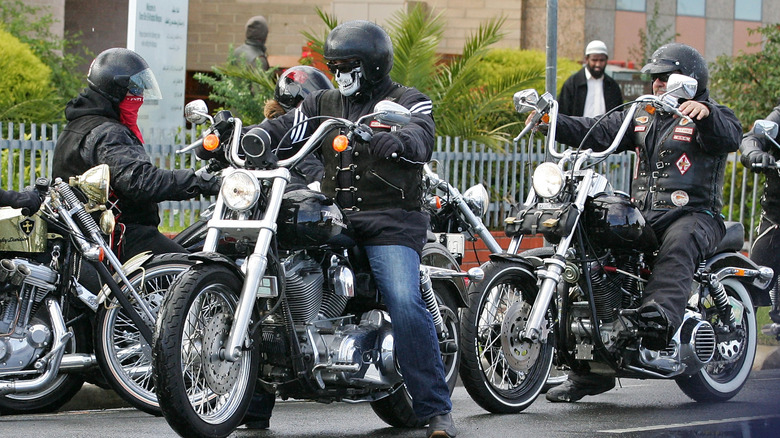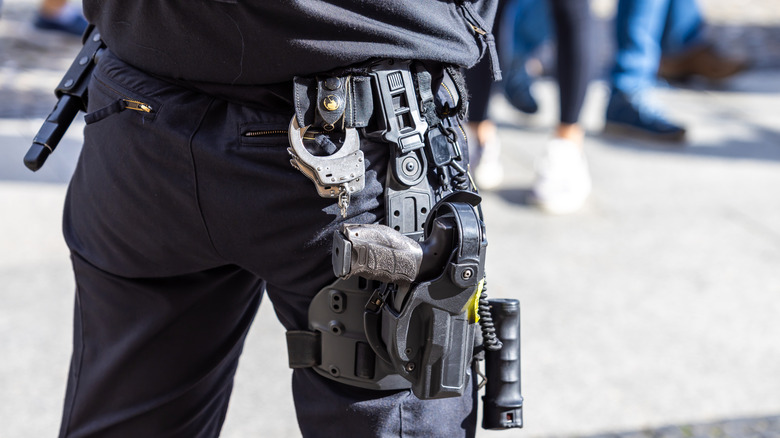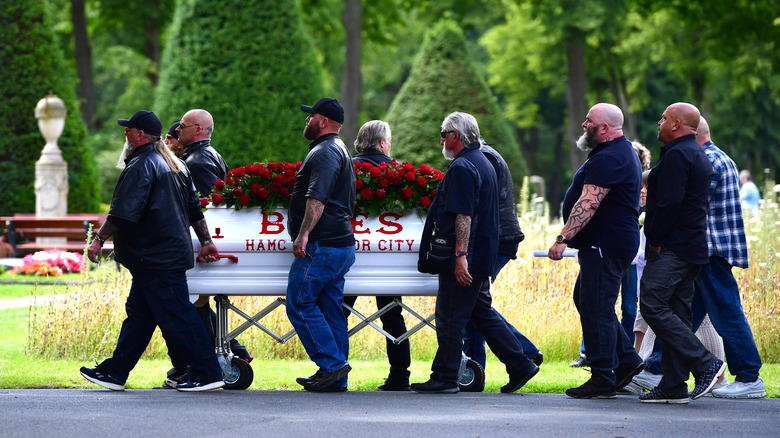Every Rule The Hells Angels Live By
Notorious, menacing, and insular, the Hells Angels Motorcycle Club is a selective bunch with a long history at the forefront of American motorcycling culture. It's also the biggest motorcycle club in California. Virtually everyone is familiar with the name, and most will recognize the "Death's Head" insignia that full members prominently wear. Some might consider the Hells Angels a criminal enterprise with a severe code of silence, while others see the outfit as a hardcore expression of a singular love for riding. Feelings are mixed, to say the least, but one thing is absolutely certain about the organization. Hells Angels bikers adhere to a strict code of conduct and must follow its rules. The group was formed in 1948 and is thought to have been named after a bomber group serving in World War II — with many of the early members being veterans. By the 1960s the organization had gained notoriety as one of the most visible among "outlaw motorcycle gangs" both by local police forces and the federal government. Indeed, reports have gone as far as to call the club "the McDonald's of organized crime."
The secretive biking community remains a significant force today, with chapters operating around the world. While the Hells Angels reportedly formed as a means of self-expression and a freewheeling lifestyle that promoted a unique sense of personal autonomy, there are a number of rules that the group has adopted throughout the years to preserve this mindset. For one, not just anyone can join the Hells Angels. Women are not welcome as members, and men who want to join must go through a lengthy induction process. These and other rules govern the lifestyle of a Hells Angel biker.
The 'application process' is lengthy
Right off the bat, anyone aspiring to join the Hells Angels will need to understand that it is a lengthy process. The organization itself suggests that the experience of becoming a member isn't something you can necessarily "pursue" in the standard sense. There's no application process or formal means of approaching the club in search of membership. Instead, the Hells Angels motorcycle club recruits members from its wider circle of known motorcycle enthusiasts.
The first step to becoming a member seemingly involves simply knowing and hanging around with an existing member of the group. Because of the secrecy involving this process and the group itself, sources can be somewhat mixed on the transition from friend to associate to member. But generally speaking, it seems to take about five years of dedication to the cause in order to become eligible to be voted into the motorcycling society. Through this time, prospective members will go through two stages of initiation before eventually becoming a full member. In order to navigate this final hurdle, however, prospects will need to be voted in unanimously by the club's members. This likely means that prospects will need to get to know every member of the club on a personal level and win them over in order to receive the requisite votes.
The Hells Angels dress code features the club's iconic Death's Head patch
Members of the Hells Angels are most prominently recognized by their vests. Members are given a patch showcasing the club's iconic Death's Head logo to place centrally on the back of their vest. Other patches also typically adorn these "uniforms" including the words Hells Angels and the name of the local chapter they belong to. Other personal touches include the "AFFA" (Angels Forever; Forever Angels) patch, signifying the member's commitment to remaining a loyal member of the club forever. Number patches also feature prominently, like the club's "81" symbolism, signifying "H" and "A." There's also the "1%" patch that shows up among some HA members. The symbolism of showcasing yourself as a "one percenter" is quite a bold statement. It signifies that you aren't part of the 99% of motorcyclists who classify themselves as law abiding citizens. Instead, one percenters follow their own code and may be involved in criminal activity.
Riders who are members of the Hells Angels prominently display their affiliation to the group. They always wear their vests when riding and consider it a prized possession. They'll actively try to keep it out of police possession if arrested, and will do everything in their power to keep their patch from being damaged, even in the event of a severe accident on the road. Only full members are allowed to wear the Death's Head patch, while others who are in various stages of the initiation process may wear some of the surrounding iconography. However, those unaffiliated with the group may not wear any of their symbols, and doing so is a great way to find yourself in hot water with the club.
A powerful bike is necessary, often a Harley-Davidson, but always American-made
The Hells Angels started as a group of like-minded military veterans who had served during World War II. After the war, veterans were given first crack at some of the surplus equipment that never made it to the front or was perhaps brought back and needed to be liquidated by the federal government. Among this stockpile was a huge trove of motorcycles and other vehicles. Vets were able to get the same kind of motorcycling gear that they had used while serving their country, and at steep discounts. It was therefore common to see a significant crossover between motorcycle owners and military veterans at the time. Harley-Davidsons we're naturally some of the most prominent bikes in this collection since the company had produced nearly 100,000 WLAs alone to support the war effort (making it one of the most important motorcycles of the conflict).
The trend of riding Harleys hasn't subsided in the years since the club's formation. HD models of all varieties (including some of the best Harley-Davidson's on the road today as well as some of the strangest the brand has ever made) are the most visible bikes owned by club members, but they aren't strictly a requirement. Instead, riders involved with or aspiring to join the Hells Angels must own a big, powerful motorcycle, and one that's American made. This last part is a non-negotiable, with Harley-Davidsons simply fitting the brief perfectly.
Riding order is rigidly established
Members of the Hells Angels naturally spend a huge amount of their time riding together. Estimates place annual figures for group rides at about 12,000 miles, and that's not counting the individual driving that each member will do on their own time. An organized ride by a Hells Angels chapter involves a bit of strict hierarchy, however. Rides can include tens or even hundreds of members in some instances, and so it absolutely can't devolve into a free for all with riders jockeying for position and creating a dangerous situation along the roadways.
Naturally, the charter president takes the lead position in these caravans. His vice president rides second with the road captain following closely behind in the three-hole. Following them is the sergeant at arms, completing the officer grouping. After these four leadership positions, Sonny Barger, a foundational member of the organization, notes that riders exhibit a sort of competitive mentality at the start of a ride to sort themselves into an order for the group outing. Generally, seniority rule will help hammer out disputes or issues, and at the back of the pack, prospects always bring up the rear.
Criminality has often been a part of the HA lifestyle, but never in the clubhouse
While chapters of the Hells Angels all behave in unique ways, members of the club have, in the past, not been strangers to the world of criminal enterprise. The organization has even served as the inspiration for outlaw motorcycle clubs like the one in "Beyond the Law." Indeed, even today the federal government considers the Hells Angels a conspiratorial organization participating in drug trafficking and other illicit behaviors as a rule rather than an exception (with the group classed among the "Big Four" outlaw motorcycle clubs). There have been plenty of arrests made among its ranks for these kind of behaviors, however the Hells Angels motorcycle club explicitly prohibits criminal behavior within the walls of its clubhouses.
Because the organization has become so notorious in these circles, members who engage in illegal behavior must do it outside the confines of the club premises so as to insulate the larger organization and their fellow members in the event of a legal crackdown. This is an important rule, considering the muscle of modern prosecutorial might through tools like the RICO statue that could hypothetically enmesh an entire chapter of the motorcycle club in legal woes if one member were to be caught in conspiratorial behavior that directly tied back to the group.
Members are never allowed to talk to the press
In keeping with the theme of privacy and insulation, Hells Angels members are never allowed to talk to the press, about anything. The only exception is a club president, who may speak to the media if there is a need to communicate some sort of information. However, every other member of the community must remain tight lipped and adhere to a strict code of silence in order to protect the organization and its members.
This stance was adopted by the Hells Angels in order to prevent a non-member from interpreting their words and speaking for them. The group is very secretive and closed off to the outside world, and even the official website remains off limits to the uninitiated. The group simply prefers to maintain as many secrets and customs about its lifestyle internally as possible, and when media personalities do arrive on the scene of their meetups and gatherings members of the group will actively turn away and work to avoid them.
Members don't provide information to anyone about other members
Another feature of this code involves an unwillingness to talk about other members to anyone. Not only will Hells Angels riders decline to respond to members of the press, they won't talk about other people in their organization to friends or family. Naturally this also means that Hells Angels members won't ever speak to police officers when questioned, and they generally decline to involve the cops in any aspect of their personal lives, even if it doesn't pertain to their membership in the club. At the heart of this rule is a promise not to snitch on brothers. In trying to protect the business and secrecy of others, members will remain silent about anything they may be involved with to anyone who isn't privy to that knowledge already — legal or otherwise.
This plays out in a unique way under certain circumstances. When a fellow member goes missing, riders won't bring up that individual to other members of the group either. There's a kind of built in firewall that Hells Angels members impose upon themselves. They don't ask, and they don't want to know the details surrounding another members' absence if it isn't already something they have information about. This is a long standing tradition, and continues to play out in Hells Angels clubhouses regardless of the chapter's history with criminality or lack thereof.
The club and brotherhood come before all else
A member who joins the Hells Angels isn't just committing themselves to becoming a part of a casual enthusiasts' club. As noted, the Hells Angels ride as many as 12,000 miles together in the average year. But they engage in these groups drives at all hours of the day and in just about any riding conditions imaginable. Members are expected to drop everything and join their fellow brothers whenever they get the call. That might mean heading to the clubhouse to discuss important group business or jumping on their hog to go for a ride around town.
A member of the Hells Angels is expected to put the club ahead of everything else that may be going on in their life. They spend a huge amount of time interacting with fellow members, which can interfere with other aspects of life like family and job requirements. Those things take a back seat to the motorcycle club, and members knowingly commit to making this tradeoff. Committed riders sacrifice other aspects that the average person factors into their daily lifestyle in favor of living and breathing motorcycling, the patch, and the brotherhood. In addition to choosing the club over any other commitment that might feature in a member's life, riders are expected to voice their opinions through their votes. The Hells Angels are an active society that votes on all kinds of matters that affect members. Attendance at meetings is mandatory and voting on issues that matter to the club is a right that members are expected to exercise.
Members cannot use or sell drugs
Even though the Justice Department considers the group to be heavily involved in drug trafficking, members of the Hells Angels are actually prohibited from using or selling drugs. This might be surprising to some readers who have grown up with the Hells Angels as a pop culture icon steeped in "bad boy-isms" and drug culture. But this is the reality that Hells Angels riders commit to living by.
Of course, in practice there have been drug busts involving Hells Angels members, so it's impossible to say how strictly chapter leadership on an individual basis adheres to this policy. Even so, it's worth noting that the organization strives to impart a sense of personal responsibility in its members. A prohibition against drug use, and particularly hard drugs like cocaine and heroin, is just one aspect of this overarching worldview. Hells Angels members are often seen participating in charity events and fundraising activities to help people in their local communities. As such, the group is incredibly difficult to paint with broad strokes and instead contains many layers of complexity.
When one biker pulls over, they all stop
Another rule that has been carried over from earlier times, Hell's angels riders rarely find themselves out and about on their own. Conflicts with rival motorcycle clubs and antagonistic relationships with law enforcement make this a dangerous proposition. When riding as a pack, if one member has to stop for any reason the entire caravan will pull over to support them. This is a sign of solidarity, and in the event that a group is up to something nefarious, it can be a grim reminder to a rival onlooker that Hells Angels members stick together through thick and thin.
The decision to stop as a unit can also play a role in interactions with police officers. No cop wants to pull over a potentially dangerous motorist, and if they know they'll be interacting with an entire gaggle of Hells Angels riders rather than just a single motorcyclist who may have committed a traffic violation, they might be less inclined to flash their lights.
Both law enforcement and certain prior offenders are ineligible to become HA members
People who are police officers or affiliated with law enforcement professionals or barred from joining the Hells Angels. However, this prohibition goes even deeper, and people who have applied to work at prisons, in law enforcement, and other similar settings are also prohibited from joining the group. This remains in effect whether a person ultimately got the job or not. Even the desire to work in a law enforcement setting precludes you from eligibility with the Hells Angels.
They see their worldview as necessarily in conflict with the rigid structure of government bureaucracy and the strictures of the law. Whether any particular chapter engages in specific acts of lawlessness and criminality or not, these opposing visions butt heads too significantly to allow for any membership crossover. Another group of individuals won't be considered for membership either, though. Anyone who has been incarcerated for abuse crimes against children marked themselves as ineligible as well. The Hells Angels don't want wretched offenders involved in their ranks, nor the individuals who put them away for their crimes.
Domestic violence and other acts of disrespect or immorality are not tolerated
Members may look hardcore and carry themselves as intimidating, take-whatever-they-like types, but the rules that Hells Angels bikers live by stipulate another approach, particularly for certain kinds of interactions. Members of the Hells Angels might fit a stereotypical look that suggests they don't care about things like healthy relationships with loved ones. But domestic violence and other similar acts of disrespect toward others are absolutely not tolerated within the organization.
Historically, the female companions of Hells Angels bikers have been allowed to ride along with their boyfriends and husbands, even if they aren't allowed to join the group themselves. In fact, they often play an integral role in the community spirit of the club. Even without access to full membership rights, bodily autonomy and an equal voice in their personal relationship are characteristics that the Hells Angels prioritize. Behaving aggressively or engaging in violence with their partners is never acceptable under the code that Hells Angels members live by.
Once a member, always a member
Finally, unlike a casual group of friends meeting up for book club or coffee, the Hells Angels acts as an exclusive club with one extremely important tenant sitting at its core. Membership in this brotherhood of bikers is for life. Hells Angels members can't hang up their jacket or retire from the organization because they have moved on to something else. Members are expected to maintain an undying loyalty to the group and uphold that code of conduct for the rest of their lives. The only way out of the Hells Angels coincides with the end of a member's time on Earth.
Of course, this doesn't mean that some members haven't tried to leave the group. Similarly, anyone who has grassed on their fellow brothers should expect to be expelled from the organization. Other crimes against the community may be dealt with through the same process. Expelled members can expect any iconography of the group to be reclaimed — patches, clothing, and even tattoos. Yes, members who have been severed from the community will have to get their tattoos removed, they may even be covered over forcibly or burned off by the organization as they give a disgraced member the boot.
